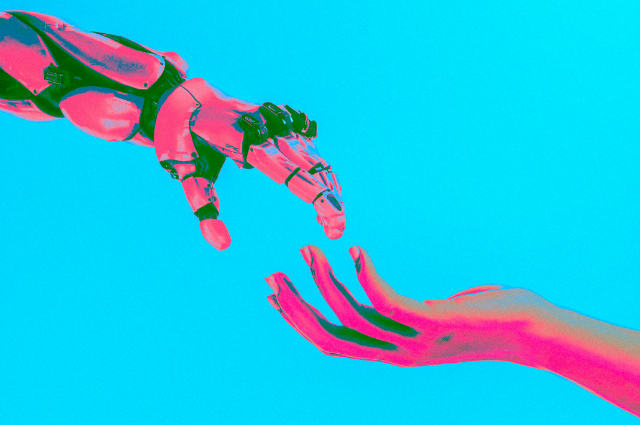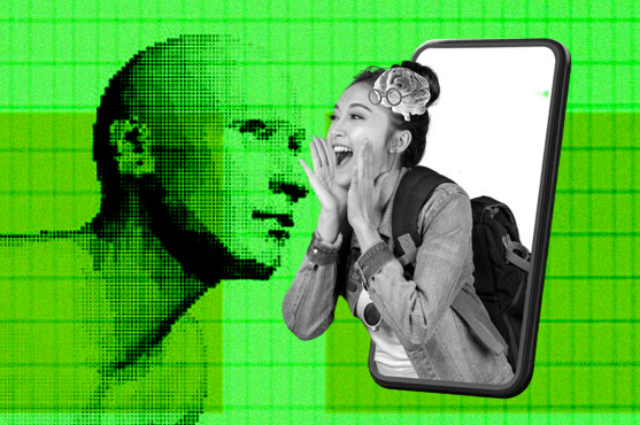Influencer marketing has been growing significantly, and in 2022 alone, the sector is expected to be worth $16.4 billion. The fact that there are more influencers every year is not surprising, since almost all marketers use some form of influencer marketing campaign strategy. Furthermore, why not? Sales and conversions can be produced via influencer marketing, as demonstrated by its effectiveness.
There's a catch, though.
The sector is expanding, but there are obstacles in its path. About 30% of marketers struggle to determine the return on investment (ROI) of their efforts, while 67% of firms are worried about influencer fraud. Selecting the proper influencers and figuring out how much to pay them are two other frequent problems. But thanks to developments in AI and machine learning, marketers may now bid these difficulties farewell.
How AI Is Changing the Sector of Influencer Marketing

Photo by Cash Macanaya on Unsplash
Influencer marketing uses AI for more than simply problem-solving. The game is elevated to a whole new level by it.
1. Enforcing NDAs and contract terms is crucial to guaranteeing that each influencer follows the terms of the agreement.
Automatic notices of copyright violation are also necessary. Artificial intelligence technologies can identify whether an influencer is likely to violate the contract and automate the entire procedure. With the use of this information, marketers will be able to reduce risks and avoid infringements before contract closure.
If influencers abide by FTC and other governmental restrictions, AI can also assist in monitoring them. These will assist brands in avoiding fines and minimizing possible harm from non-compliance.
2. Predicting the future performance of an influencer
Although no one can foretell the future, you can obtain a very accurate picture by using AI techniques. Artificial intelligence (AI) uses natural language processing (NLP) to forecast if an influencer can achieve a brand's goals.
Marketing professionals might avoid collaborating with influencers who are unable to produce desired outcomes by anticipating the possibility of an influencer campaign's success. AI lessens the need for trial and error when locating and collaborating with the ideal influencers.
AI can also assist companies in locating possible collaborations with micro-influencers, who frequently have audiences that are more engaged than those of more well-known influencers. Reaching a larger audience with more pertinent material promotes brand awareness and boosts sales conversions.
3. Ease of managing many influencer programmes at the same time
There are numerous moving components when managing an influencer marketing strategy. The campaign's start and conclusion dates are decided upon, metrics and engagement rates are examined, each influencer's content is monitored, and the actual outcomes are contrasted with the original objectives.
All of these data points may be kept in one place, and you can use AI to extract insightful information. An AI solution may connect more dots the more data points it is supplied. Furthermore, scalability isn't a problem because AI solutions make it easier for influencers with a range of follower counts to launch campaigns without any problems.
4. Partnering with online influencers
The existence of virtual influencers is arguably AI's most obvious contribution to influencer marketing. Businesses are increasingly embracing virtual influencers to market their goods and services in the past few years. Virtual influencers are computer representations of actual individuals that are used to produce social media content that looks authentic.
The use of virtual influencers has several benefits:
- More affordable than standard celebrity endorsements
- More command over the content of online influencers
- Capacity to convey a unified brand message
- A novel approach to forging an emotional connection with target populations
- Influencer profiles that have been carefully chosen for every target market offer integrated analytics for more precise metrics
But there are also a few disadvantages:
- Companies might not have as much control over virtual influencers as they believe.
- Virtual influencers may come out as spooky or insincere.
- Insufficient human narrative may lead to a reduced level of profound involvement.
Platforms for AI Influencer Marketing
The top influencer marketing platforms that have integrated AI solutions to assist you in achieving the aforementioned benefits are listed below.
1. Grin
For companies looking to expand their influencer marketing efforts, Grin is among the top AI platforms. Grin offers users information about audience demographics, engagement rates, and return on investment through its AI-driven analytics. The process of creating a campaign is simple, and payments and product seeding within the platform simplify processes.
2. Influencity
One of the most well-known and established platforms for influencer marketing is Influencity. It continued to innovate to meet the demands of the industry, which is how it got this far. It accomplishes this, among other things, by offering look-alike and precision-finding tools that assist marketers in compiling lists of highly relevant influencers.
3. Find Your Influence
Another proven influencer marketing platform, Find Your Influencer, was created by developers and marketers who have watched influencer marketing grow. Because of this, one of its standout features is its campaign modules, which assist marketers in negotiating solid terms with influencers. These modules go above and above the legal protections by automatically adding tracking links to make sure that your terms are being followed. They do more than merely cite the content brief.
4. Influsoft
Viral Nation, a prominent digital marketing business, created Influsoft, a top influencer marketing platform. Influsoft provides artificial intelligence (AI) insights into content engagement, such as sentiment analysis related to emotions. In-depth audience analysis like this one helps you maximise the effectiveness of your influencer marketing initiatives by forecasting campaign performance in the future.
5. CreatorIQ
By putting "content first" in your discovery process, CreatorIQ's AI technologies enable you to delve deeply into an influencer's past engagements. Their AI-powered analytics engine draws logical conclusions about an influencer's audience based on even the most specific aspects of the influencer's material, such as mentions, geography, and emoji usage. These help you filter out phony profiles and identify the ideal influencer for your campaign.
Conclusion
As you can see, artificial intelligence has transformed influencer marketing and made it more successful and efficient. You may solve issues that plague marketers, such as influencer fraud, underperforming influencers, inappropriate content, and others, by utilizing AI influencer marketing technologies.
Regardless of the size of their following, the discovery of AI algorithms found in the top influencer marketing platforms assists in identifying the appropriate audiences and connecting you with the most productive influencers. This makes it more likely that your campaign will succeed and guarantees a profit every time.

